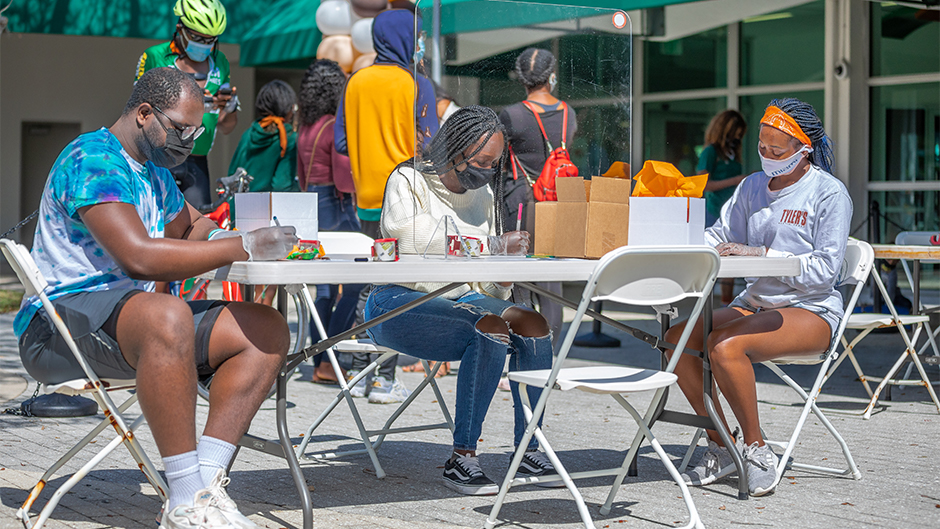Last week, students across the University of Miami’s Coral Gables Campus participated in various discussions and events as part of the Butler Center for Service and Leadership's annual Social Justice Week. The programming, supported by multiple student organizations and campus departments, aimed to promote dialogues, experiential activities, and initiatives that foster equity, justice, and inclusion to bridge gaps within the campus community.
Despite limitations to in-person gatherings, the Butler Center team coordinated a combination of virtual and in-person events for the students. Andrew Wiemer, director of the Butler Center, said the students, faculty, and staff worked tirelessly to coordinate accessible events for remote and on-campus students.
“I was so happy to see our community come together around these important initiatives and dialogues. We've had a chance to be creative in COVID-19. And I think we've been able to see that creativity come to life through some of these virtual events for Social Justice Week,” Wiemer said.
The week kicked off with “Invisible,” a weeklong art installation by Nadine Hall, a graduate student studying fine arts. The moving exhibition was displayed on the Whitten University Center's first floor aimed to stimulate conversation and create an opportunity for students to reflect and share varying ways they have felt invisible.
Students were able to attend a virtual screening of “What Is Social Justice? From Words to Action.” The short video compiled student voices from across the University stating their definition of social justice and the student experience. Many also participated in a social media livestream with the LGBTQ Student Center and Student Health Service that discussed sexual health, PrEP (pre-exposure prophylaxis), and why minority populations widely distrust vaccines.
The final virtual event, “Beyond the U,” discussed homelessness, gentrification, and food insecurity in the Miami community. The discussion took place in partnership with Repair the World Miami, a local nonprofit that encourages communities to pursue a just world, and the University of Miami Hillel.
Landon Coles, a junior studying political science, served as a student representative on the Social Justice Week planning committee and Black Awareness Month organization. Coles, along with other students and faculty members across campus, were responsible for producing the events last week.
“While this month, and the preparations leading up to it, have defied all senses of normalcy, with the tools of flexibility and creativity we have maintained that sense of celebration, history, and joy that typically defines [February],” Coles said. “Our events, albeit virtual, were just as important, powerful, and seamless as any other.”
In addition to the virtual events, students participated in the Hostile Terrain 94 exhibit, a global art project by anthropologist Jason De León that raises awareness about the humanitarian crisis at the southern U.S. border.
Students participated by creating papier mâché dolls to represent the more than 600 children separated from their families at the U.S. border. The pop-up exhibition will be installed at the Otto G. Richter Library in late February.
Ashley Phillips, a sophomore studying nursing, and Kayla Davis, a sophomore studying broadcast journalism, helped coordinate the Black Awareness Month Day of Service.
“We got together and decided to partner with Sylvester Comprehensive Cancer Center and the School of Nursing and Health Studies to get the community together and do something nice for our health care workers,” Phillips said.
Students volunteered their time to prepare care packages that were filled with candles, treats, hand sanitizers, and handwritten notes of gratitude for front-line health care workers.
Kennedy Robinson, assistant director for Multicultural Student Affairs, and Lindsey Woods, assistant director of the Butler Center for Service and Leadership, were advisers for the event and were among the several staff members who helped coordinate Social Justice Week.
“BAM Day of Service has been a well-established partnership between the Black Awareness Month student organization, Multicultural Student Affairs, and the Butler Center for Service and Leadership for a number of years,” Woods said. “Serving as advisers to the BAM Day of Service committee is always a very rewarding experience, as the students are excited to be positive contributors to their community through meaningful volunteer service. We were very excited that the unique opportunity presented itself this year to be able to make this event a part of Social Justice Week.”
Collette Mighty, assistant director of the Butler Center, said the success of the virtual and in-person events is all because of the students' efforts. "We try to create various opportunities for students to be confident in their decision to get involved, connected to beneficial campus resources, and take action in the community beyond these events," she said.
Students interested in staying involved with the Butler Center beyond Social Justice Week can get additional information here.

